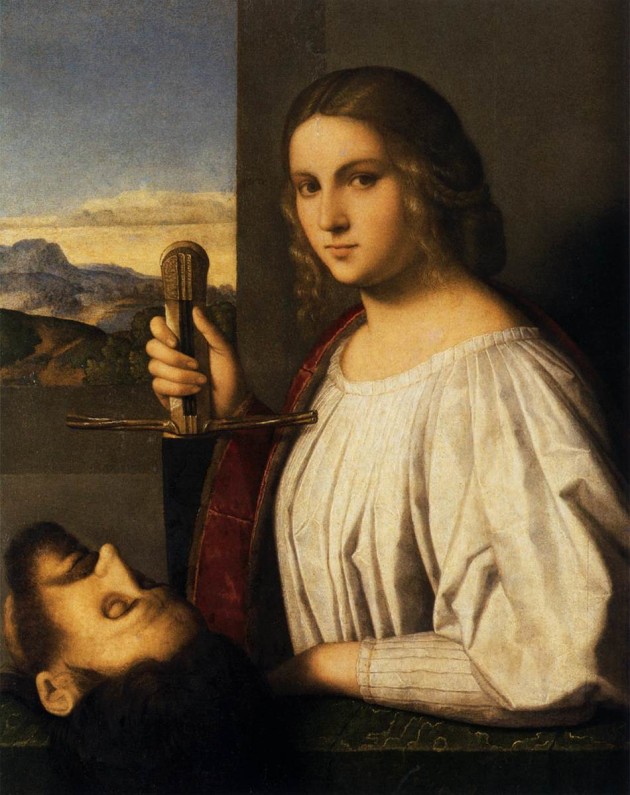
by Rishe Groner
What “Maoz Tzur” Has To Do With Our #MeToo Moment

Judith with the head of Holofernes, painting by Vincenzo Catena
“Maoz tzur yeshuati…” rings a song chanted the world over following the kindling of the Hanukkah lights, best known in its translation, “Rock of Ages.” Though it wasn’t my family’s custom to sing this seven-paragraph tribute to Jewish resistance overcoming oppression, I was somewhat familiar with not only the famous first verse, but also with the second-to-last. That penultimate verse is a tribute to opposing the Hellenist oppression featured in the Hanukkah story. It includes a phrase that’s been put to countless Hasidic tunes, and always leaves me jumping with joy inside.
“Yevanim nikbetzu alay,” it begins. “The Hellenists gathered against me, in the days of the Hasmoneans.”
Then the language does more than I could ever describe, so let’s go on a journey through the Hebrew:
“Upartzu chomot migdalay“—“and they breached the walls of my towers”/
“V’timu kol hashmanim“—“and defiled all of the oil.”
The Hebrew words used here for “partzu”––the root word is “pratz,” meaning breaching and spreading out––and “timu,”––making impure––have strong connotations through the rest of Hebrew liturgy. These enemy Yevanim really got deep up in this business, invading territory that was not theirs and leaving corruption in their wake.
But there’s a happy ending. “Uminotar kankanim, naaseh nes lashoshanim“—”from the remains of the vessels, a miracle was made for the roses.” The roses, used here as a term of endearment for the Judean people, also signify original innocence. They represent the beauty of those who have experienced breach, defilement, impurity.
Last year, singing this song brought me a clear vision. As with the devastated feminine imagery of Bat Zion (who often represents exiled Jewry) and so many images throughout the prophets, this was a language of rape.
Every time I sing this verse, the visuals come, stronger and stronger, and all I can do is pray. Because the answer to the pain is deep within the song. The answer comes from “minotar kankanim”—from the tiny bit that was left.
I have heard a teaching that the real miracle of Hanukkah is not that the oil lasted eight nights when it was only supposed to last one. According to this teaching, the real miracle is that we looked for the oil at all. That deep down in the recesses of our bashed and battered temple—the temple of Jerusalem and the temple of our body and soul—we dug deep to find that last storehouse of pure olive oil.
I wonder as we journey through this collective Post Traumatic Stress Disorder of #MeToo how we can dig deep to find that cruse of pure oil. How to travel past the anger, the how dare he, the what if it hadn’t happened this way, the how could I have protected myself or him or her, the why isn’t this over yet. I’m constantly in a battle as more and more comes to light. Incidents in my own life I glossed over as normal, I now see did not enable me to live my life fully, safely, securely. People and a systems and structures who breached my boundaries—my tall, protective towers—corrupted my sense of pure self-worth, the rich oil that lay within.
This year, I have been digging deep for the answers, for that last jar of oil, and encountered another story—a midrashic account of Hasmonean resistance to Hellenism.
A daughter of the high priest Yochanan, sister of the Priestly family, had been betrothed for marriage. This was a rare occurrence, as the Hellenist government had required that all virgin women be brought to the king prior to their marriage, causing people to simply not get married. But she was getting married, and so at a celebration of these nuptials, she exposed herself. Causing an eruption of indignation from the populace of rabbis and priests, she stood proudly, strongly, deep her in feminine vulnerability and power: “Really? You want to stone me, burn me, judge me? I am only exposing myself here, to all of you—my brothers and countrymen. You have been exposing the women of this country for years, acquiescing to the demands of the Hellenist rulers, defining the temple with Lagan worship, and handing over your daughters—your own daughters!—to this rapist of a ruler. Are you kidding me?” I can almost hear her shout.
Today is Chag Habanot, the festival of the daughters. It is often commemorated by eating cheese to honor of Judith decapitating Holofernes. Today, I’m going to add a new custom to the festival. In the spirit of the midrash, I will call out oppression.
Like the Hasmonean midrashic heroine, we all must stand up now and say: Are you really blaming me for baring my soul, when you’ve perpetuated a system of oppression all this time that hands women over to be, literally, f*cked? Are you not seeing the systems of abuse that exist and instead blaming individual victims? Can you not see the defilement of the pure oil of the feminine soul (of all genders)? Will you not help us rebuild those boundaries and dig deep for that final cruse of pure oil?
It is the oil we will sing of tonight when we kindle our last Hanukkah lights.